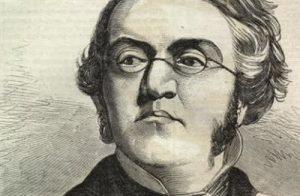 I learned this past week that I share a birthday with an eminent novelist of Victorian days, William Makepeace Thackeray author of Vanity Fair. Had he lived, Thackeray would have been 195 years old last Tuesday.
I learned this past week that I share a birthday with an eminent novelist of Victorian days, William Makepeace Thackeray author of Vanity Fair. Had he lived, Thackeray would have been 195 years old last Tuesday.
Although Thackeray’s literary stock has seen its ups and downs over the course of these two centuries, there’s little arguing that his masterwork, Vanity Fair, is a social satire with staying power.
Contributor to Punch
Born in Calcutta on July 18, 1811, Thackeray was sent to England at age five to attend a boarding school in Chiswick Mall. He polished his knack for the verbal send-up writing for Punch. Vanity Fair‘s first serial instalment appeared in the Times on January 1847.
But as it's summer, I decided to take another turn through Vanity Fair. The episodic structure of the narrative allows for plenty of suspense–and made it easy to pick up where I left off all those years ago. As it turns out, the excursion has been delightful. I confess that as an undergraduate, I never quite got through all 822 pages of my 1962 Signet Classic edition – required reading for a course in the 19th-century novel. It's not that I found the novel an old-fashioned slog. In fact, I remember it was quite funny. I simply ran out of time. That was a lot of reading.
Architect of the anti-hero (Vanity Fair is subtitled, helpfully, “A Novel Without a Hero”), Thackeray's biting wit spirits us through a world of, well, vain and shallow people. Becky Sharp, a social climber before the type gained gravitas, is the ringleader of this carnival. But alas, no one comes out looking very pretty as Thackeray sets ablaze the petty vanities of English society–from maids and stockbrokers to soldiers and wealthy aunts–against the background of the Napoleonic wars.
Rack punch
Take a look at the picture Thackeray paints of Joseph Sedley, a Vanity Fair denizen who does little more than lolls about, waiting to inherit. He's just then in the nuptial sites of Becky Sharp, as she and he set to venture out for a night in Vauxhall:
“Jos was in his glory, ordering about the waiters with great majesty. He made the salad; and uncorked the Champagne, and carved the chickens; ate and drank the greater part of the refreshments on the tables. Finally, he insisted on having a bowl of rack punch; everybody had a rack punch at Vauxhall. ‘Waiter, rack punch.”
No surprise that Jos finds himself undone by the accursed punch. “What is the rack in the punch, at night, to the rack in the head of a morning,” the piper of Vanity Fair sagely observes.
The engagement is grounded even before it takes flight. But Becky, sharp as she is, won't be kept down. Many more adventures involving Miss Sharp, the Sedley's, and the Crawleys (of Queen's Crawley) ensue. And if you're not laughing out loud at least once in every chapter, then you're not paying attention.
Pick up a copy of Vanity Fair. Trust me, this book is way better than (the most recent) movie.
Where to buy Vanity Fair
Vanity Fair is available in various formats on the Amazon UK website here: https://amzn.to/2GhpZ1S










